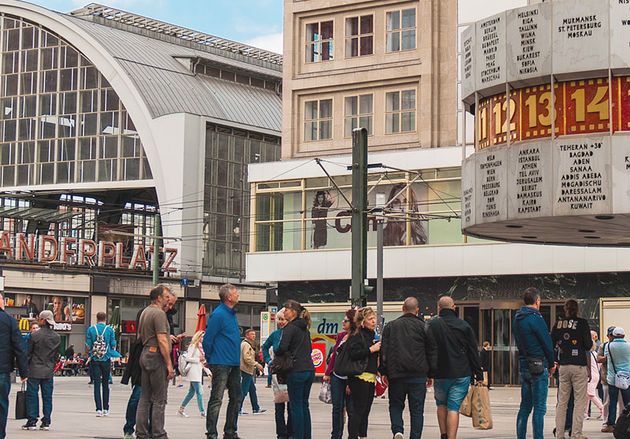Inside the collaborative world of Jewish evangelism. An article by Aaron Lewin.
![Photo:Pavel Nekoranec. Unsplash via [link]Lausanne Movement[/link].](https://cms.evangelicalfocus.com/upload/imagenes/61637c6982a65_lgaberlin940.jpg) Photo:Pavel Nekoranec. Unsplash via [link]Lausanne Movement[/link].
Photo:Pavel Nekoranec. Unsplash via [link]Lausanne Movement[/link].
Nathan moved here looking for the ideal job after his studies. A psychologist with a very rational mind, he soon turned to spirituality to explain what science could not explain and soon found himself exploring the claims of Jesus.
Sima moved here to study. Coming from a deeply religious background she has abandoned her childhood religion. Ironically, her anger at God has provoked her to seek answers here for the questions that haunt her.
Sharon moved here after finishing her studies and began to look around for a job. However, she soon got side-tracked and found herself pregnant. Initially, she was not interested in spirituality, but since becoming a single mother she has started to ask questions about God.
The three stories above could belong to anyone, anywhere in the world. Surprisingly, however, they are the stories of three young Israelis living in Berlin. Yes, Berlin. Young, native born Jewish Israelis have been flocking to Berlin in their thousands over the last fifteen years.
But what has brought about this return of the children of Holocaust survivors to the land and city where their ancestors were so hated, abused, and ultimately murdered? Everyone has their own story, like the three above.
Some are attracted by a lower cost of living, cheaper study opportunities, or the chance to get a good job. Others want to escape from the pressure-cooker atmosphere in Israel, or the influence of their family, or perhaps even their local rabbi. Still others want to live out their independence and have an adventure.
This incredible phenomenon of young Jewish Israelis returning to Germany, and specifically to Berlin, is very significant. First, it allows the reestablishment of Jewish life in Germany and shows that God is faithful to his people.
But second, and perhaps most importantly, it gives Israelis an unprecedented exposure to the gospel. Here they have the chance to learn about Jesus, many for the first time, and can do so without the pressure that they would experience in Israel.
Indeed, many Israelis who come to Berlin are liberal and open-minded and are excited to hear about something not easily accessible by them in Israel.

[photo_footer] Kevin McCutcheon, Unsplash CC. Image via Lausanne Movement. [/photo_footer]
Believers in Berlin are asking: How can all these young Jewish men and women be reached with the gospel? There are an estimated 20,000 Israelis living in Berlin, with that number increasing dramatically during the summer tourist period. 1
Although the potential harvest is great, the workers are few. At the time of writing, there are a total of about seven people from four organizations dedicated to reaching out to Israelis full-time.
In other words, that requires each worker to share the gospel with approximately 4,000 people. Not nearly enough workers to have a significant impact.
But God had other ideas. This difficult situation has caused these four organizations (Beit Sar Shalom, Missionary Church, Finnish Israel Mission, and Jews for Jesus) and others to start working together to reach Israelis in Berlin.
The apostle Paul writes that ‘we, being many, are one body in Messiah’ (Rom 12:5). Jesus’ desire is for us to work together, regardless of our organizational affiliation, to reach these young Jewish people with the gospel.
Around 5 years ago, God put a desire in the hearts of a number of us to start a monthly event reaching out to young Israelis. It was an event for seekers, in Hebrew, designed to provide a safe space in a foreign country where they could speak about deep issues in their native tongue.
That soon grew into a second event, a monthly Bible study, where many Israelis started to read the words of Jesus for the first time. It became clear to us that God had brought us all to Berlin in order to reach them and wanted us to work together.
And it worked! The synergy of our cooperation allowed us to achieve something much greater than I could have possibly achieved alone, or that we could have all achieved separately.
But working together is not easy. Even though we know what the Bible says about partnership, we know it is what the Lord wants, and we know that it is the only logical way to reach as many Israelis as possible in Berlin, it is still not easy.
It took time for all of us to get to know each other. We had to communicate well and establish common goals. We had to invest time in our interpersonal relationships so that we could work better together.
We laughed, joked, and had fun together. And yet, we also shared honestly. We shared how we were feeling about the work, about the partnerships and about our contacts. We confronted each other when we saw things that displeased us.
As a concrete example, towards the start of our working together, I had, by mistake, given the impression to some pastors in Berlin that the monthly meetings were put on solely by our organization.
This was of course very hurtful for the others and I had to apologize and correct my mistake. I am grateful that the Lord did not let my clumsiness ruin our collaboration.
Another time, one of the organizations reported that an Israeli had come to faith through one of their workers, without mentioning the rest of us. As time went on, we learned how to bring our grievances to each other, when to ask for forgiveness, and ultimately, learned to forgive. As with all other relationships, communication is key.
The time and energy we invested in our relationships during the ‘good times’ helped us to reconcile during the inevitable times of conflict that we have experienced and, no doubt, will experience again in the future.

[photo_footer] Kevin McCutcheon, Unsplash CC. Image via Lausanne Movement. [/photo_footer]
We also have to be generous and share our resources. We work out a rota for paying for the monthly events so that no-one would be unfairly burdened. We have a similar system for who would lead the devotion each time.
We share our Israeli contacts with each other and invite them to common events and invite each other to events from our organizations, meaning that our contacts would hear the gospel again and again from different people in different ways.
If I go on holiday, I am thankful that my partners would meet up with ‘my’ contacts. We report honestly and openly to our donors and subscribers about what we are doing together with our partners and are not ashamed to mention them and their organizations by name.
Slowly but surely, we realize that we are not seven people working for four organizations. We are seven people working together among Israelis for the kingdom of God.
Since then, the constellation of our inter-mission team has been chopped and changed as people come and go in Berlin. This requires investing in new relationships, which can, of course, be tiring.
After all, it is difficult to invest in people, especially when they leave after a few years. But if we have the wider kingdom of God in view, no investment is wasted.
I am convinced that the good experience of collaboration here will help those who move on to develop good collaboration at the next stop on their journey, wherever that may be.
And, for the new people coming in, it is easier to integrate them into the inter-mission team when they know that we have already been investing time and energy in building relationships so that we can work together.
We still have much to learn as a team. It would be less complicated to have a clear vision, set achievable goals, and evaluate success effectively if we were all part of one organization with a designated leader or leadership committee.
But our current set up pushes us to work harder as we look to the future and ask ourselves key questions, such as: What do we want this ministry to look like in five years’ time? Has our work thus far been effective? What needs to be changed for improvement or development?
Reflecting together on these questions, we need to be humble and look first at our own misgivings before, perhaps, mentioning our grievances with our partners. As we continue to be open and honest with each other about our joys and sorrows in our partnership, we can build trust.
I sincerely believe that good partnership work does not depend on the avoidance of conflict, but rather on the ability to channel conflict for good, resulting in deeper, longer-lasting team relationships.
The better we know and trust each other, the more effective we can be in vision-casting, goal setting, and evaluation.
I hope that the scenario in Berlin just described is an encouragement and an example for you, wherever you are and whatever work you are involved in. Here in Berlin, we need to reach Israelis, now. We cannot reach them effectively if we all try separately. We need each other.
But our collaboration should not only be born out of necessity. It is what our Lord wants. However, it will only work if the Lord is the centre of our collaboration, if we are honest and open with each other, and if we are humble.
It will only work if we do the hard work of building relationships among ourselves. Ironically, building our own relationships is part of our outreach. After all, Jesus did say, ‘By this everyone will know that you are my disciples, if you love one another’ (John 13:35).
When one of our Israeli contacts found out that we were four separate organizations working together, he was amazed. ‘I never would have noticed if you hadn’t told me’, he commented. That is the biggest compliment for our collaboration that we could ever hope to get! 2
Aaron Lewin is the Director of Jews for Jesus Germany. Born in Israel and raised in England, he currently lives with his wife Rebekka and their four children in Berlin, Germany.
This article originally appeared in the September 2021 issue of the Lausanne Global Analysis and is published here with permission. To receive this free bimonthly publication from the Lausanne Movement, subscribe online at www.lausanne.org/analysis.
1. Editor’s note: ‘According to figures published by the Berlin-Brandenburg Statistics Office, the number of Israelis registered in Berlin between 1993 and 2014 more than doubled to 6,265. In the meantime, however, there is talk in the media of up to 30,000. The Israeli Embassy puts the number at just under half that total. Reliable figures are rare, in part because many Israelis use their second passport. In any event, it is certain that 5,319 Israeli citizens were officially registered in Berlin in 2018.’ Accessed 21 May 2021, https://www.deutschland.de/en/topiclife/israelis-in-berlin-young-confident-adventurous. ↑
2. Editor’s note: See articles by Phill Butler entitled, ‘Is Our Collaboration for the Kingdom Effective?’ in the January 2017 issue of Lausanne Global Analysis, https://lausanne.org/content/lga/2017-01/is-our-collaboration-for-the-kingdom-effective, and ‘Who Gets the Credit in Collaborative Efforts’ in the July 2020 issue of Lausanne Global Analysis, https://lausanne.org/content/lga/2020-07/who-gets-the-credit-in-collaborative-efforts. ↑

Las opiniones vertidas por nuestros colaboradores se realizan a nivel personal, pudiendo coincidir o no con la postura de la dirección de Protestante Digital.
Si quieres comentar o